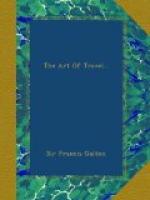It is reasonable enough that a small worn-out party should adopt this plan, when they are travelling in a desert where the absence of water makes it impossible to delay, and when they are sinking for want of food. If the ox were killed outright there would be material for one meal only, because a worn-out party would be incapable of carrying a load of flesh. By the Abyssinian plan the wounded beast continues to travel with the party, carrying his carcase that is destined to be turned into butcher’s meat for their use at a further stage. Of course the idea is very revolting, for the animal must suffer as much as the average of the tens or hundreds of wounded hares and pheasants that are always left among the bushes after an ordinary English battue. To be sure, the Abyssinian plan should only be adopted to save human life.
When I travelled in South-West Africa, at one part of my journey a plague of bush-ticks attacked the roots of my oxen’s tails. Their bites made festering sores, which ended in some of the tails dropping bodily off. I heard such accidents were not at all uncommon. The animals did not travel the worse for it. Now ox-tail soup is proverbially nutritious.
Insects.—Most kinds of creeping things are eatable, and are used by the Chinese. Locusts and grasshoppers are not at all bad. To prepare them, pull off the legs and wings and roast them with a little grease in an iron dish, like coffee. Even the gnats that swarm on the Shire River are collected by the natives and pressed into cakes.
Wholesome and poisonous Plants.—No certain rule can be given to distinguish wholesome plants from poisonous ones; but it has been observed that much the same thing suits the digestion of a bird that suits that of a man; and, therefore, that a traveller, who otherwise would make trials at haphazard, ought to examine the contents of those birds’ crops that he may catch or shoot, to give a clue to his experiments. The rule has notable exceptions, but in the absence of any other guide it is a very useful one.
The only general rules that botany can give are vague and full of exceptions: they are, that a great many wholesome plants are found among the Cruciferae, or those whose petals are arranged like a Maltese cross, and that many poisonous ones are found amongst the Umbelliferae.
Nettle and Fern.—There are two moderately nutritious plants—nettle and fern—that are found wild in very many countries: and, therefore, the following extract from Messrs. Hue and Gabet’s ‘Travels in Thibet’ may be of service:—“When the young stems of ferns are gathered, quite tender, before they are covered with down, and while the first leaves are bent and rolled up in themselves, you have only to boil them in pure water to realise a dish of delicious asparagus. We would also recommend the nettle, which, in our opinion, might be made an advantageous substitute for spinach; indeed more than once we proved this by our own experience. The




